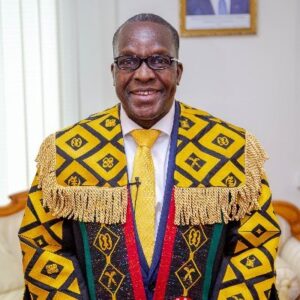Akandoh: Government Lacks Funds to Finish Agenda 111 Projects

The Minister of Health, Kwabena Mintah Akandoh, has expressed concerns regarding the government’s inability to secure sufficient funding to complete the ongoing Agenda 111 hospital projects. This initiative, launched by the previous New Patriotic Party (NPP) government, was aimed at addressing critical gaps in healthcare accessibility, particularly in underserved and rural areas of the country. However, Akandoh’s comments have raised doubts about the future of the initiative, which was intended to revolutionize healthcare infrastructure across Ghana.
Akandoh pointed out that one of the major obstacles facing the successful completion of the Agenda 111 project is a lack of financial resources. According to him, the NPP administration, which spearheaded the initiative, did not allocate the necessary funds to ensure the projects’ completion before leaving office. This failure to properly fund the projects has now left the current government struggling to find the financial backing required to continue the work, he said. In an interview with the media on Monday, March 10, Akandoh lamented the slow progress of the hospitals under the project and stated that the government was facing an acute funding shortage, which has hindered further development.
Akandoh further explained the issue by recalling the precedent set during the tenure of former President John Dramani Mahama. He noted that when Mahama’s administration left office, there were several ongoing healthcare projects, and the government ensured that adequate funds were left behind to complete these projects. In contrast, he said that no such provisions were made for the Agenda 111 projects, leaving the current administration in a difficult position with no funds available to advance the hospitals’ construction.
“We have no financial resources to continue these projects. When we left office, we ensured there was money available for the completion of ongoing health projects. But today, as I speak to you, we don’t have a single Pesewa to finish these hospitals because there was no reliable or dedicated source of funding for this initiative,” Akandoh stated.
The Agenda 111 project was launched in August 2021 by the NPP government with the goal of constructing 111 hospitals across Ghana. This includes the establishment of 101 district hospitals, six regional hospitals, two psychiatric hospitals, and the redevelopment of the Accra Psychiatric Hospital. The ambitious project was conceived as a solution to the chronic shortage of healthcare facilities in many parts of the country, particularly in districts that lacked proper hospitals. By providing these new healthcare facilities, the initiative was designed to improve the overall healthcare system, enhance access to medical services, and address the healthcare needs of a growing population.
Despite the ambitious objectives of the project, it has faced significant delays and challenges. Financial constraints, difficulties in acquiring land, and logistical issues have all contributed to the slow pace of construction. Initial projections indicated that each hospital would cost approximately $17 million, and the entire project was expected to take about 18 months to complete. However, nearly three years into the initiative, many of the hospitals are still in the early stages of construction, with some barely moving past the foundational level.
Akandoh’s statement underscores the financial and logistical difficulties that have plagued the project from the outset. While the NPP administration had outlined a grand vision for expanding healthcare infrastructure in the country, the lack of sufficient funds and resources has seriously impeded the realization of these plans. The government’s inability to secure the necessary funding for Agenda 111 has now cast doubt on whether the project will ever be fully completed.
The stalled progress of Agenda 111 has also raised concerns about the future of the country’s healthcare system. With many districts still lacking adequate healthcare facilities, the successful implementation of this project was seen as crucial to improving healthcare access and outcomes in underserved regions. However, the ongoing delays suggest that the promise of enhanced healthcare infrastructure for these communities may remain unfulfilled unless substantial investments are made to address the financial shortfall.
In conclusion, the Agenda 111 project, while an ambitious and well-intentioned effort to enhance Ghana’s healthcare system, is facing severe challenges due to a lack of financial resources. The current government is struggling to secure the funds necessary to complete the hospitals, and the project’s future remains uncertain. As the healthcare needs of the population continue to grow, it is crucial that solutions be found to ensure that initiatives like Agenda 111 can be fully realized.





